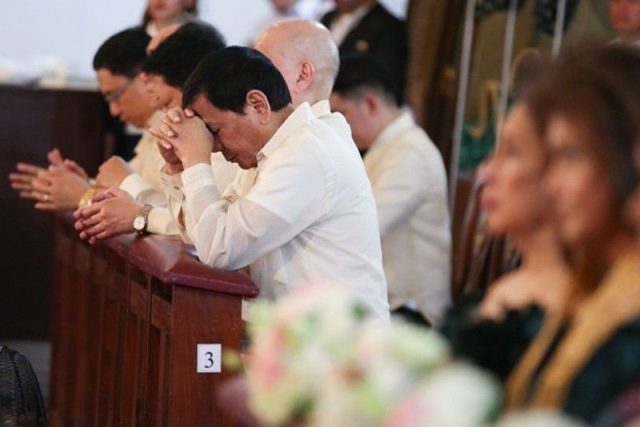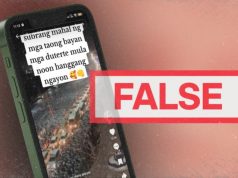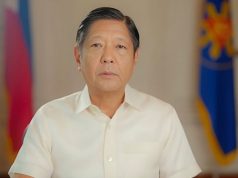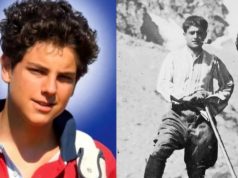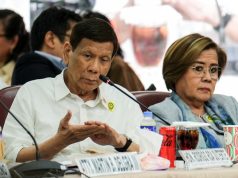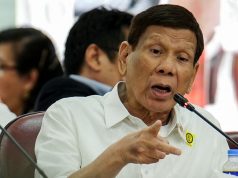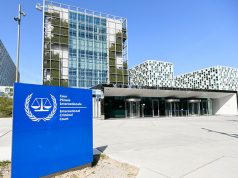Some Filipinos and members of the Catholic Church, the largest religious denomination in the Philippines, expressed concerns over President Rodrigo Duterte’s suggestion to kill “useless” bishops at a recent awarding ceremony.
“These bishops, kill them. They are useless, all they do is criticize,” Duterte said at the awarding ceremony for the Presidential Award for Child-Friendly Municipalities and Cities at the Malacañang on Wednesday.
He later reiterated his stance that the church was the “most hypocritical institution” in the country and that despite his opposition to the church, he was still a firm believer of the God worshiped by practicing Catholics.
“I never said I do not believe in God. What I said is your God is stupid, mine has a lot of common sense. That’s what I told the bishops. I never said I was an atheist,” he said.
Duterte in November 2018 had just traded barbs with Caloocan Bishop Pablo Virgilio David, a staunch critic of his war on drugs. In a series of statements, Duterte accused the priest of using illegal drugs and stealing from the church’s donation collection.
David in response said that he had been mistaken by the president as someone else and that Duterte was “sick.”
“You see, people who are sick sometimes do not know what they are talking about, so we should just bear with them,” the priest said in a statement.
Filipinos, including members of the Catholic church, voiced concern about the president’s tirades against the country’s dominant religion.
This kind of hate speech is like marching orders because it’s from the president. Please, Filipino Catholics, help protect our bishops & priests, show the country you are a force. It will take more than prayers.
(But yes Lord, hear our prayers!) https://t.co/aihLyI4JJR— Jhoanna Lynn Cruz (@JhoannaLynnCruz) December 5, 2018
"KILL THE BISHOPS. THEY'RE USELESS"@IntlCrimCourt here's a clear, unequivocal order of Duterte ordering the killing of Bishops. If anyone of them is killed, their blood is on your hands for doing nothing! https://t.co/qXzRg1QFrp
— TRAIN WRECK (@_QuePasaChica_) December 5, 2018
With humility, I am challenging all the bishops in the PHL Roman Catholic Church. Tomorrow, please visit to the nearest PNP police station in your area and file a formal police blotter against President Duterte. Kung hindi ngayon, kailan pa? Kung hindi kayo, sino pa?
— Neil Bernales (@acbernales) December 5, 2018
The widening rift
The conflict between the Catholic church and the president has centered largely on the clergy’s opposition to the administration’s war on drugs, which has been linked to more than 10,000 killings around the country since Duterte entered office in May 2016.
In early 2018, David responded to accusations from Duterte allies that the church had a hand in staining the president’s reputation.
“After all, most of the casualties in the drug war are coming from the urban poor communities that voted for this government,” David said after former house speaker Pantaleon Alvarez blamed the church’s statements for a dip in the president’s satisfaction ratings.
The Catholic Bishops Conference of the Philippines, one of the most vocal church groups in the country, in July 2018 called for a three-day fast to protest the “abuses” in the country under the Duterte administration.
Duterte even before entering office already admitted to distancing himself from the Catholic church, which he is a member of. In May 2016 just weeks after his victory in that year’s presidential race. In a statement, he explained said that he believed in God but not in organized religion.
He had previously been criticized before the presidential race when jokingly cussed at Pope Francis during a speech in December 2015, even before he clarified his stance on religion. He has since apologized for the statement.
In June 2018, he was criticized even by administration allies when he remarked “Who is this stupid God?” while discussing the biblical creation story during his speech. He explained later on that he was merely critiquing the mainstream interpretation of the Old Testament God in the Bible.
He later apologized to the church and met with various church leaders and groups to repair ties. He formed a committee with leaders from various religious sects and met with a group of bishops during a meeting facilitated by House Speaker Gloria Macapagal-Arroyo.
He also committed himself to a “moratorium” on tirades against the church in July 2018. But the moratorium was broken overnight when he criticized church leaders for invoking the name of God in a speech in Clark, Pampanga that month.
Despite his tirades throughout the years, he has been seen attending Mass a number of times.
Duterte admitted in July 2018 that he stopped considering himself as a Catholic when he was allegedly molested as a teenager by a Catholic priest in Davao.

